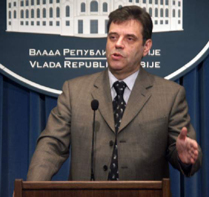Q:
A:
Government sets goals of better life of citizens and a stable state
Belgrade,
4 March 2005
Serbian Prime Minister Vojislav Kostunica said today that the government’s goals in the past year have been for the people to live better and for the state to be stable, as these two goals are in harmony with each other.
Kostunica told a press conference marking one year in office of the Serbian government, that the work of the government will be marked primarily by the Feasibility Study, with a positive outcome expected by the end of March. The study represents the first formal step of the country towards the EU and a green light for Serbia-Montenegro from the EU. He stressed that the feasibility study is verification of the government’s work and of what has been done on the widest international scale. It also represents an assessment of the government’s work by the EU and its bodies.
A positive feasibility study depended on cooperation with The Hague Tribunal, and in this respect, everything has been done to remove that final obstacle, said Kostunica and added that the EU and the Tribunal’s approach, when it comes to what can be regarded as cooperation, is no longer defined as full cooperation and meeting the obligations in full, but as a significant progress in cooperation like that that has been made in the past few weeks with voluntary surrenders of those indictees who used to hold top positions in the army. It is clear that the issue of cooperation with The Hague will no longer pose an obstacle to the Feasibility Study, said Kostunica.
As for changes in the economy, it is quite natural that any government’s goal is for its citizens to live better, he said. To achieve that goal, the government must set in motion an economy that has been devastated for years, said Kostunica and added that the rise in industrial production and agricultural output, the increase in real wages, credit growth, and the repayment of the state’s debt to citizens are the most significant changes in the economy. Also, he stressed, this government has taken steps to repay debt to the London Club of creditors, the Russian Federation, and commercial debts, such as the case of Kragujevac’s Zastava and Italian Fiat.
In the past year, progress has been recorded in several fields, although in some areas, especially when it comes to the economy, expectations have been directed to the year 2005, said Kostunica. He specified that he had in mind the restructuring of public sector enterprises as well as investment and privatisation, fields in which the government is encouraged by the stance of both foreign investors and business communities as seen in the restoration of preferential treatment for Serbian sugar and the agreement on textile.
He said that the upcoming conference of the European Bank for Reconstruction and Development (EBRD) to be held in Belgrade in May this year represents an increased recognition of Serbia and demonstrates an investment interest in the Serbian economy.
Kostunica pointed out that the Serbian government is committed to the preservation of the State Union of Serbia and Montenegro, which means that it puts integration above disintegration, which is in line with the government’s European orientation. He went on to say that yesterday’s talks between Montenegrin Prime Minister Milo Djukanovic and EU High Representative for the Common Foreign and Security Policy Javier Solana shows that the government has chosen the right path.
The Serbian government has done a lot to address the issue of Kosovo-Metohija, and the proof of that is the Plan for a Political Solution to the Situation in Kosovo-Metohija and wide-ranging diplomatic activities aiming to familiarise all relevant factors with the government’s position, Kostunica stressed and added that this year will be very important for Kosovo-Metohija thanks to the opening of the issue of measuring standards, and perhaps, the issue of its status. That is why a consensus of all political forces in Serbia is needed.
The government’s inclination is to look for a solution in the status of Kosovo-Metohija within the State Union of Serbia and Montenegro, with a high degree of autonomy, and without changes of existing borders. In this way, no one is the defeated side, and if anyone stands to gain, it is the region and the international community, said Kostunica. He also recalled that late last year, the government established the Fund for Kosovo-Metohija, which has so far raised more than 110 million dinars.
Speaking about the government’s treatment of minorities in Serbia, Kostunica said that the government attaches great significance to this issue and that it has backed and funded national councils of all ethnic minorities, including the recently formed council of the Macedonian minority. Kostunica recalled that a council for ethnic minorities has been set up, gathering together chairmen of the councils of every ethnic minority and line ministers. He voiced satisfaction with the government’s engagement in resolving tensions in Vojovodina and with the improved relations of ethnic communities in this province.
The government has also attached great significance to institutions as well as their strengthening and stabilising, because a state that does not have all the institutions is lame and unstable, said Kostunica. He pointed out that the government has proposed 120 bills, of which 50 were entirely new laws, while the rest of them were changes and amendments to existing laws. Many of these are systemic laws and some of them were the first laws regulating certain fields. As for a new constitution, the Serbian government has done everything to see the fundamental law adopted, and, were it up to the government, a new constitution would have been adopted long ago, said Kostunica.
A positive feasibility study depended on cooperation with The Hague Tribunal, and in this respect, everything has been done to remove that final obstacle, said Kostunica and added that the EU and the Tribunal’s approach, when it comes to what can be regarded as cooperation, is no longer defined as full cooperation and meeting the obligations in full, but as a significant progress in cooperation like that that has been made in the past few weeks with voluntary surrenders of those indictees who used to hold top positions in the army. It is clear that the issue of cooperation with The Hague will no longer pose an obstacle to the Feasibility Study, said Kostunica.
As for changes in the economy, it is quite natural that any government’s goal is for its citizens to live better, he said. To achieve that goal, the government must set in motion an economy that has been devastated for years, said Kostunica and added that the rise in industrial production and agricultural output, the increase in real wages, credit growth, and the repayment of the state’s debt to citizens are the most significant changes in the economy. Also, he stressed, this government has taken steps to repay debt to the London Club of creditors, the Russian Federation, and commercial debts, such as the case of Kragujevac’s Zastava and Italian Fiat.
In the past year, progress has been recorded in several fields, although in some areas, especially when it comes to the economy, expectations have been directed to the year 2005, said Kostunica. He specified that he had in mind the restructuring of public sector enterprises as well as investment and privatisation, fields in which the government is encouraged by the stance of both foreign investors and business communities as seen in the restoration of preferential treatment for Serbian sugar and the agreement on textile.
He said that the upcoming conference of the European Bank for Reconstruction and Development (EBRD) to be held in Belgrade in May this year represents an increased recognition of Serbia and demonstrates an investment interest in the Serbian economy.
Kostunica pointed out that the Serbian government is committed to the preservation of the State Union of Serbia and Montenegro, which means that it puts integration above disintegration, which is in line with the government’s European orientation. He went on to say that yesterday’s talks between Montenegrin Prime Minister Milo Djukanovic and EU High Representative for the Common Foreign and Security Policy Javier Solana shows that the government has chosen the right path.
The Serbian government has done a lot to address the issue of Kosovo-Metohija, and the proof of that is the Plan for a Political Solution to the Situation in Kosovo-Metohija and wide-ranging diplomatic activities aiming to familiarise all relevant factors with the government’s position, Kostunica stressed and added that this year will be very important for Kosovo-Metohija thanks to the opening of the issue of measuring standards, and perhaps, the issue of its status. That is why a consensus of all political forces in Serbia is needed.
The government’s inclination is to look for a solution in the status of Kosovo-Metohija within the State Union of Serbia and Montenegro, with a high degree of autonomy, and without changes of existing borders. In this way, no one is the defeated side, and if anyone stands to gain, it is the region and the international community, said Kostunica. He also recalled that late last year, the government established the Fund for Kosovo-Metohija, which has so far raised more than 110 million dinars.
Speaking about the government’s treatment of minorities in Serbia, Kostunica said that the government attaches great significance to this issue and that it has backed and funded national councils of all ethnic minorities, including the recently formed council of the Macedonian minority. Kostunica recalled that a council for ethnic minorities has been set up, gathering together chairmen of the councils of every ethnic minority and line ministers. He voiced satisfaction with the government’s engagement in resolving tensions in Vojovodina and with the improved relations of ethnic communities in this province.
The government has also attached great significance to institutions as well as their strengthening and stabilising, because a state that does not have all the institutions is lame and unstable, said Kostunica. He pointed out that the government has proposed 120 bills, of which 50 were entirely new laws, while the rest of them were changes and amendments to existing laws. Many of these are systemic laws and some of them were the first laws regulating certain fields. As for a new constitution, the Serbian government has done everything to see the fundamental law adopted, and, were it up to the government, a new constitution would have been adopted long ago, said Kostunica.












